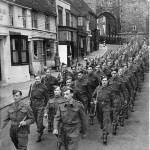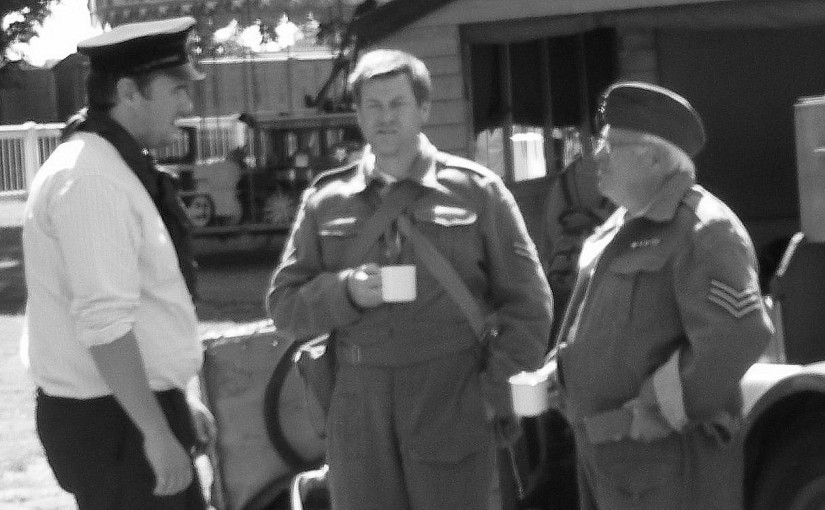Rye at War
Part Two — In The Front Line
In August and September of 1940 Ryers had a grandstand seat for the greatest air battle in history, the “Battle of Britain” that was raging in the skies overhead.
The town suffered another serious bombing attack on October 9th, 1940 when 18 50 kilo bombs were dropped, doing extensive damage.
In September the invasion threat was at its height, it seemed certain that the Germans would attempt an invasion at any minute. With the idea in mind that a man would fight harder defending his own home town the Rye company of the Home Guard was allotted the positions on the town side of the river, along the river bank from the bridge on the River Tillingham to Bridge Point at Rock Channel, and then on from this point to the Railway bridge over the Rother. The Home Guard was fitted into the line between detachments of regular troops. In the event these men were not called upon to do battle on their home soil but there is no doubt that had the Germans come they would have been given a very hot reception and every inch of the ground would have been hard fought.

Reasons given for Hider’s decision not to invade were many and varied. Many think that the R.A.F’s mastery of the air was the deciding factor, others say that the Navy’s sea power was the deterrent, but the greatest factor that prevented Hitler taking the salute at a victory parade in London was the will and resolve of the British people.
We invite readers to let us have any personal stories or recollections that you may have of the war. We are interested in anything that happened in and around Rye and anything that happened to Ryers while serving on the war fronts abroad.
“All Hell Broke Loose”
One evening during the war I was on my way home and intended delivering a parcel in Ferry Road. Passing over the Crossing the Gate-keeper and I exchanged friendly greetings. He advised me not to delay, saying it looked like being a dirty night. The sky was dark and overcast, so I hurriedly left him.
Suddenly the siren went. I started to run, having only a few yards to go, when out of the clouds came a Dornier. It was so low I saw the crosses on it. The late Mr. Harry Tanton and I were the only two people in the street. He shouted out, “Take cover I flung myself at the friends door to go inside, and found to my horror it was locked. I stooped down
between the door and window in a corner, putting three volumes of World War I I had been carrying over my head. The guns opened up and as I looked up I saw what looked like a Black Kettle come from the plane. The next moment “all hell broke loose.” There was a terrific explosion and I was covered in earth. My shopping basket was taken from my hand by the blast and hurled across the small garden and a huge dark object came flying over the roof and landed about 2 yards from me. Glass and debris flew past me and I started to pray.
Then followed an uneasy silence. I picked myself up, my knees shook, I could hardly stand, and then people opened their doors. Mr. Tanton told my husband afterwards, he quite thought “I’d had it”.
So did I!
When finally I made tracks for home, all the telephone wires were down over the crossing, and a Maidstone & District bus was flung sideways across the street, dirt was thick on the roads.
I realized afterwards had I not delivered the parcel in Ferry Road that evening I would have been close to the Gas Office on my normal route home where another bomb was dropped, killing Mrs. Etcell and Mrs. Barham.
That night I found some new cups not even cracked in my shopping basket, but the steel needles on my knitting were twisted right round by the blast. It was a truly terrifying experience I’ll not forget.
Mrs. B. Wickersham, 26 New Winchelsea Road
1942
Extract from the St. Anthony of Padua Church Chronicle.
Year 1942. Fr. Kevin was Parish Priest with and (late) Bro. Pascal
January 1st—New Year’s Day. Two German planes came over and machine-gunned Rye. No casualties and only slight damage done. The Manchester Regiment has now replaced the Canadians.
January 11th—First snow of the year.
March 4th—First Fraternal Meeting of the different Clergy of Rye was held at the Vicarage.
March 18th—Fr. Richard attended Committee meeting for the foundation of the Rye Girl’s Club. Mrs. Batchelor elected on the General Committee.
September 16th—Rye was bombed, one being dropped at the end of Watch Bell Street at the steps, causing damage and a few casualties. Church and Friary suffered slightly.
September 22nd—Second bombing within a week. This time four bombs were dropped, one destroying the Cinema, another landing in the front of the Gun Garden, destroying several houses, and two others behind the Hope Anchor on Watch Bell Street. Several people suffered severe damage to their houses. Church and Friary again suffered damage.
November 15th—The Church Bell was rung again to commemorate the Victory of the Troops in Africa.
November 27th—Brother Pascal arrived at Rye.
December 2nd—Fr. William Gilgunn called at the Friary; his first visit.
December 6th, Sunday—Planes machine-gunned and cannon-shelled Rye at 8.40 a.m. A few were injured and one proved fatal.
December 11th—Fr. William Gilgunn was killed from machine-gun bullets by a German plane. This was on the Peasmarsh Road. Age 38.
From the April 1967 issue of Rye’s Own
All articles, photographs, films and drawings on this web site are
World Copyright Protected. No reproduction for publication without
prior arrangement.
© World Copyright 2016 Cinque Ports Magzines Rye Ltd., Guinea Hall
Lodge Sellindge TN25 6EG.
